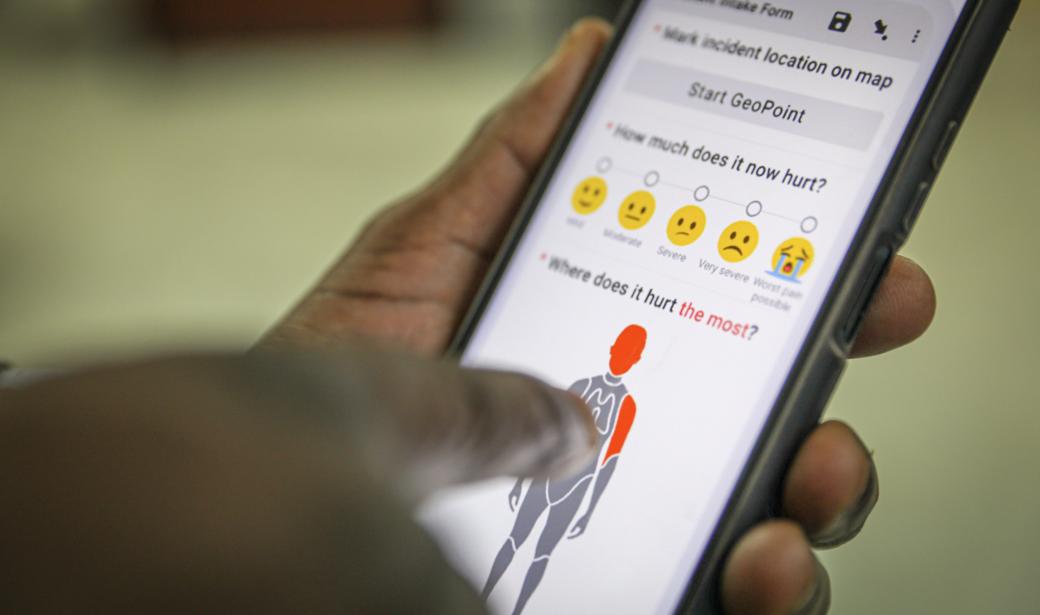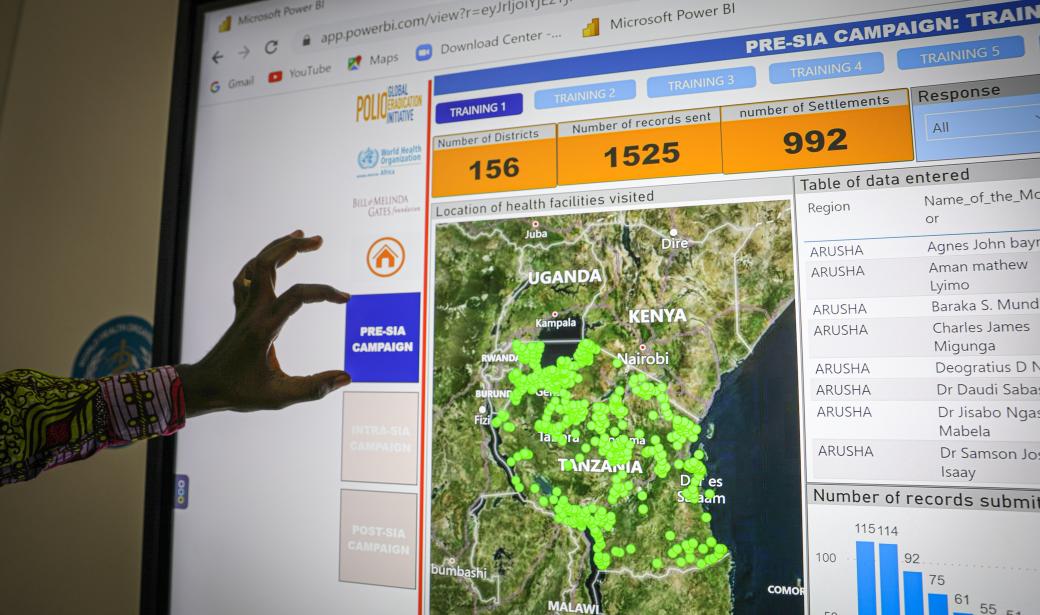Arusha, Tanzania – Reliable data is crucial for effective disease surveillance and outbreak response. In the wake of the wild poliovirus outbreak in Malawi in February 2022, neighbouring countries stepped up surveillance to detect cases. They have also rolled out mass vaccination campaigns to protect children from the debilitating virus. In Tanzania, the use of Open Data Kit (ODK) tools is accelerating response to alerts of potential polio cases and helping to curb the virus.
“Without the ODK application it would have been way harder to get the early alert we just received,” says Sally Tettey Emmanuel, a WHO Field Epidemiologist on an Acute Flaccid Paralysis (AFP) in Tanzania, referring to a recent alert.
Emmanuel is supporting the national response efforts to fight polio in Tanzania as part of a multi country strategy. Tanzania launched mass vaccination drives in the regions bordering Malawi before expanding across the country to reach all eligible children with the crucial dose. It has already carried out two rounds of polio vaccination.
Emmanuel is supporting the national response efforts to fight polio in Tanzania as part of a multi country strategy. Tanzania launched mass vaccination drives in the regions bordering Malawi before expanding across the country to reach all eligible children with the crucial dose. It has already carried out two rounds of polio vaccination.
Emmanuel, working from the Emergency Operations Centre in Tanzania’s northern city of Arusha which was set up with support from WHO, closely monitors every alert and data received via the ODK tool: a fast and effective mobile application that has improved data collection and public health response in the country.
Emmanuel explains how he acted on a recent alert about symptoms of paralysis observed in a child.
“I called the vaccinator that observed the case and headed to the field to conduct the appropriate investigation and sample collection to validate the acute flaccid paralysis (AFP) within 24 hours," Emmanuel says.
AFP is defined by the acute onset of weakness or paralysis with reduced muscle tone in children. There are many infectious and non-infectious causes of AFP. Polio, caused by wild poliovirus (the naturally circulating strain) is one cause of AFP, and so early detection of AFP is critical in containing a potential outbreak. Respiratory and stool samples are optimal for enterovirus detection.
“I called the vaccinator that observed the case and headed to the field to conduct the appropriate investigation and sample collection to validate the acute flaccid paralysis (AFP) within 24 hours," Emmanuel says.
AFP is defined by the acute onset of weakness or paralysis with reduced muscle tone in children. There are many infectious and non-infectious causes of AFP. Polio, caused by wild poliovirus (the naturally circulating strain) is one cause of AFP, and so early detection of AFP is critical in containing a potential outbreak. Respiratory and stool samples are optimal for enterovirus detection.
ODK is a simple mobile application that provides software and standards for field electronic data collection. Through a simple editable form, independent monitors, vaccinators, supervisors and health workers can not only plan but also evaluate the quality of a vaccination campaign by logging data and key observations in the forms.
An information dashboard provides near real-time geolocation points (marked using the ODK tool) where vaccination posts can be set up, how many health centres have been visited, the quality of markings on houses visited by vaccinators as well as the quality of finger markers used to identify children who have received the vaccine. ODK also allows to easily determine the location of children who have missed their vaccination.
An information dashboard provides near real-time geolocation points (marked using the ODK tool) where vaccination posts can be set up, how many health centres have been visited, the quality of markings on houses visited by vaccinators as well as the quality of finger markers used to identify children who have received the vaccine. ODK also allows to easily determine the location of children who have missed their vaccination.
The results and data from Tanzania’s two wild poliovirus vaccination rounds gathered through the ODK tool will help the health authorities draw lessons and implement the upcoming vaccination phases.
However, the gains of electronic data management are not limited to the fight against polio. Emmanuel notes that with the skills and knowledge acquired in the polio response, he has also been able “to build and introduce similar tools in the routine health care system; specifically, during yellow fever outbreaks or while supporting the tracking of confirmed COVID-19 cases during the pandemic response.”
However, the gains of electronic data management are not limited to the fight against polio. Emmanuel notes that with the skills and knowledge acquired in the polio response, he has also been able “to build and introduce similar tools in the routine health care system; specifically, during yellow fever outbreaks or while supporting the tracking of confirmed COVID-19 cases during the pandemic response.”
For Additional Information or to Request Interviews, Please contact:
Monge Marta Villa
Communications Officer
Polio Eradication Programme
WHO Regional Office for Africa
Email: mongem [at] who.int (mongem[at]who[dot]int)
Tel: + 34 636 04 76 79








